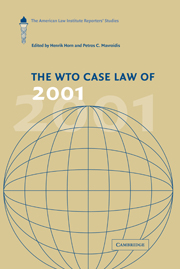Book contents
- Frontmatter
- Contents
- Foreword
- A note on the American Law Institute
- List of reporters
- 1 Introduction
- 2 EC – Asbestos European Communities – Measures Affecting Asbestos and Asbestos-Containing Products
- 3 US – Shrimp United States – Import Prohibition of Certain Shrimp and Shrimp Products, Recourse to Article 21.5 of the DSU by Malaysia
- 4 US – Lamb United States – Safeguard Measures on Imports of Fresh, Chilled or Frozen Lamb Meat from New Zealand and Australia: What Should Be Required of a Safeguard Investigation?
- 5 EC – Bed Linen European Communities – Anti-Dumping Duties on Imports of Cotton-Type Bed Linen from India
- 6 Mexico – Corn Syrup Mexico – Anti-Dumping Investigation of High Fructose Corn Syrup from the United States, Recourse to Article 21.5 of the DSU by the United States
- 7 Argentina – Ceramic Tiles Argentina – Definitive Anti-Dumping Measures on Imports of Ceramic Floor Tiles from Italy
- 8 US – Lead and Bismuth II United States – Imposition of Countervailing Duties on Certain Hot-Rolled Lead and Bismuth Carbon Steel Products Originating in the United Kingdom: Here Today, Gone Tomorrow? Privatization and the Injury Caused by Non-Recurring Subsidies
- 9 US – Export Restraints United States – Measures Treating Export Restraints as Subsidies
- 10 Canada - Dairy Canada – Measures Affecting the Importation of Dairy Products and the Exportation of Milk
- 11 US – Section 110(5) Copyright Act USt – Section 110(5) of the US Copyright Act, Recourse to Arbitration under Article 25 of the DSU: Would've or Should've? Impaired Benefits due to Copyright Infringement
- Index
- References
11 - US – Section 110(5) Copyright Act USt – Section 110(5) of the US Copyright Act, Recourse to Arbitration under Article 25 of the DSU: Would've or Should've? Impaired Benefits due to Copyright Infringement
Published online by Cambridge University Press: 06 July 2010
- Frontmatter
- Contents
- Foreword
- A note on the American Law Institute
- List of reporters
- 1 Introduction
- 2 EC – Asbestos European Communities – Measures Affecting Asbestos and Asbestos-Containing Products
- 3 US – Shrimp United States – Import Prohibition of Certain Shrimp and Shrimp Products, Recourse to Article 21.5 of the DSU by Malaysia
- 4 US – Lamb United States – Safeguard Measures on Imports of Fresh, Chilled or Frozen Lamb Meat from New Zealand and Australia: What Should Be Required of a Safeguard Investigation?
- 5 EC – Bed Linen European Communities – Anti-Dumping Duties on Imports of Cotton-Type Bed Linen from India
- 6 Mexico – Corn Syrup Mexico – Anti-Dumping Investigation of High Fructose Corn Syrup from the United States, Recourse to Article 21.5 of the DSU by the United States
- 7 Argentina – Ceramic Tiles Argentina – Definitive Anti-Dumping Measures on Imports of Ceramic Floor Tiles from Italy
- 8 US – Lead and Bismuth II United States – Imposition of Countervailing Duties on Certain Hot-Rolled Lead and Bismuth Carbon Steel Products Originating in the United Kingdom: Here Today, Gone Tomorrow? Privatization and the Injury Caused by Non-Recurring Subsidies
- 9 US – Export Restraints United States – Measures Treating Export Restraints as Subsidies
- 10 Canada - Dairy Canada – Measures Affecting the Importation of Dairy Products and the Exportation of Milk
- 11 US – Section 110(5) Copyright Act USt – Section 110(5) of the US Copyright Act, Recourse to Arbitration under Article 25 of the DSU: Would've or Should've? Impaired Benefits due to Copyright Infringement
- Index
- References
Summary
Facts of the case
This dispute between the European Communities and the United States originated when the United States amended its copyright law in a way that nullified and impaired certain benefits promised to the European Communities under the Agreement on Trade Related Aspects of Intellectual Property (TRIPs). Article 9.1 of TRIPs requires all WTO members to comply with Articles 1 through 21 of the Berne Convention of 1971. Among the provisions of the Berne Convention thus incorporated into the TRIPs Agreement is one that grants to authors of literary and artistic works the exclusive right to authorize “the public communication by loudspeaker or any analogous instrument transmitting, by signs, sounds or images, the broadcast of the work,” and another that grants to authors of dramatic and musical works the exclusive right to authorize “any communication to the public of the performance of these works.”
In 1998, the United States amended its Copyright Act of 1976 to expand substantially the exemption enjoyed by certain establishments from the obligation to pay royalties on some copyrighted music. Subparagraph (A) of amended Section 110(5) of the US Copyright Act exempts eating, drinking, and retail establishments that transmit music on a single receiving apparatus of the kind commonly used in private homes (this part of Section 110(5) remains essentially unchanged from its previous version).
- Type
- Chapter
- Information
- The WTO Case Law of 2001The American Law Institute Reporters' Studies, pp. 281 - 299Publisher: Cambridge University PressPrint publication year: 2004
References
- 1
- Cited by



